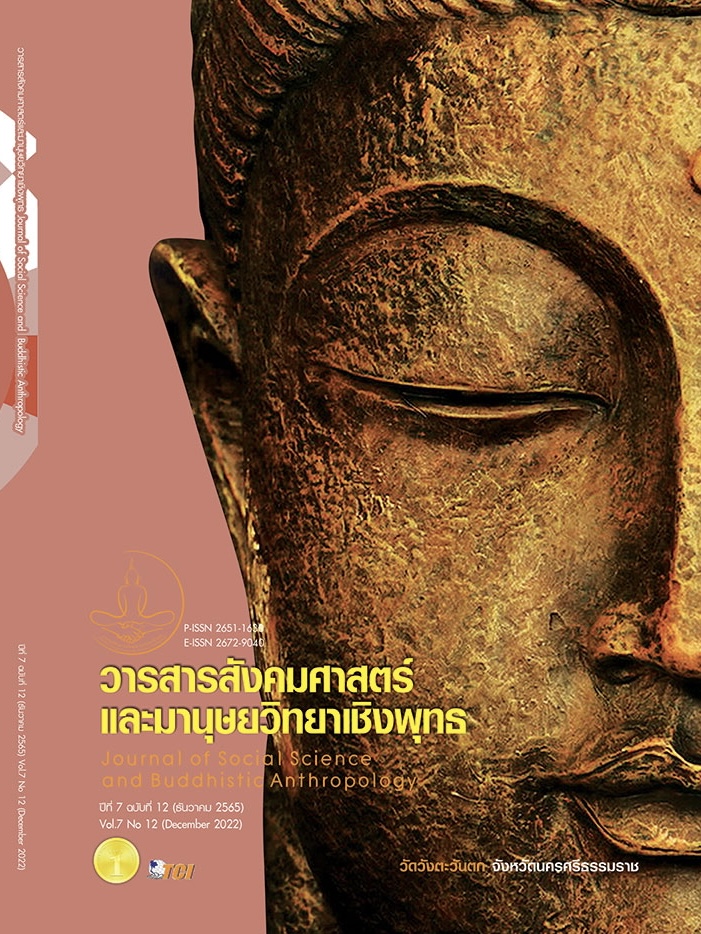อิทธิพลของภาวะผู้นำการเปลี่ยนแปลงต่อผลการปฏิบัติงาน ของพนักงาน
คำสำคัญ:
ภาวะผู้นำการเปลี่ยนแปลง, องค์การ, ผลการปฏิบัติงาน, พนักงานบทคัดย่อ
บทความนี้เป็นบทความวิชาการ มีวัตถุประสงค์ เพื่อนำเสนอภาวะผู้นำการเปลี่ยนแปลงว่ามีความสัมพันธ์ต่อผลการปฏิบัติของพนักงานในองค์การ ท่ามกลางบริบทขององค์การที่มีความท้าทาย ความไม่แน่นอนและการเปลี่ยนแปลงอย่างรวดเร็ว องค์การต้องมีการปรับตัวบริหารจัดการทรัพยากรในองค์การ รวมทั้งทรัพยากรมนุษย์เพื่อดำเนินงานให้บรรลุเป้าหมาย อยู่รอดอย่างยั่งยืน และเติบโต โดยที่องค์การแทบทุกองค์การต้องมีคือ ผู้นำ และสิ่งที่ขาดไม่ได้ คือ ภาวะผู้นำการเปลี่ยนแปลง ถือว่ามีความสำคัญอย่างยิ่งที่ส่งผลต่อการปฏิบัติงานของพนักงาน และองค์การในระยะยาว มีผลการศึกษาเชิงประจักษ์ยืนยันว่า ภาวะผู้นำการเปลี่ยนแปลงมีผลต่อพฤติกรรมพนักงานในการสร้างผลการปฏิบัติงานที่ดีทั้งเชิงเนื้องานตามหน้าที่และเชิงบริบทอื่น ๆ ที่อยู่นอกเหนือจากงานหลัก ให้มีประสิทธิภาพที่เหนือกว่า มีการบรรลุผลสำเร็จมากกว่าที่คาดไว้ เมื่อแต่ละปัจเจกบุคคลมีผลการทำงานที่ดีแล้ว จะส่งผลต่อผลการปฏิบัติงานของทีม และผลการดำเนินงานขององค์การโดยรวมด้วย ภาวะผู้นำการเปลี่ยนแปลงมีความสำคัญในการกระทำเป็นแบบอย่างเชิงพฤติกรรม ผู้สร้างให้เกิดแรงบันดาลใจให้พนักงานปฏิบัติงานได้อย่างเต็มความสามารถ สร้างผลงานที่เหนือกว่าความคาดหวัง กระตุ้นทางปัญญาให้มีแนวคิด วิธีการปฏิบัติงานที่แตกต่างจากเดิมหรือคิดแนวทางใหม่ในการแก้ปัญหา คิดสร้างสรรค์นวัตกรรม และสร้างความท้าทายใหม่ ๆ ให้พนักงานทำงานเพื่อผลประโยชน์ของกลุ่มหรือองค์การ พร้อมการคำนึงถึงความแตกต่างของพนักงานรายบุคคล สำหรับข้อเสนอแนะ ควรที่จะนำแนวคิดหรือทฤษฎีภาวะผู้นำการเปลี่ยนแปลง มาประยุกต์กับทางรัฐประศาสนศาสตร์ในประเทศไทยมากขึ้น ซึ่งจะเป็นประโยชน์ต่อทั้งทางด้านการบริหารทรัพยากรมนุษย์และการบริหารองค์การ
เอกสารอ้างอิง
Armstrong, M. (2017). Armstrong on reinventing performance management: Building a culture of continuous improvement. London: Kogan Page.
Bacha, E. (2014). The relationship between transformational leadership, task performance and job characteristics. Journal of Management Development, 33(4), 410-420.
Bass, B. M. & Avolio, B. J. (1990). The implications of transactional and transformational leadership for individual, team, and organizational development. Research in organizational change and development, 4(1), 231-272.
Bass, B. M. & Avolio, B. J. (1993). Transformational leadership and organizational culture. Public administration quarterly, 17(1), 112-121.
Bass, B. M. (1985). Leadership and performance beyond expectations. New York, NY: Free.
Bass, B. M. (1998). Transformational leadership: Industrial military, and educational impact, mahwah. Mahwah, NJ: Lawrence Erlbaum Associates.
Bennett, N. & Lemoine, G. J. (2014). What a difference a word makes: Understanding threats to performance in a VUCA world. Business Horizons, 57(3), 311-317.
Birasnav, M. (2014). Relationship between transformational leadership behaviors and manufacturing strategy. International Journal of Organizational Analysis, 22(2), 205-223.
Borman, W. C. & Motowidlo, S. J. (1997). Task performance and contextual performance: The meaning for personnel selection research. Human performance, 10(2), 99-109.
Burns, J. M. (1978). Leadership. New York, NY: Harper & Row.
Byars, L. L. (2008). Human resource management. (9th ed.). Boston: McGraw-Hill/Irwin.
Campbell, J. P. et al. (1990). Modeling job performance in a population of jobs. Personnel Psychology, 43(2), 313-575.
Day, D. V. et al. (2014). Advances in leader and leadership development: A review of 25 years of research and theory. The leadership quarterly, 25(1), 63-82.
Dessler, G. (2005). Human resource management. (10th ed.). Upper Saddle River, NJ: Pearson/Prentice Hall.
Erkutlu, H. (2008). The impact of transformational leadership on organizational and leadership effectiveness: The Turkish case. Journal of Management Development, 27(7), 708-726.
Goodman, M. (2012). Creativity and strategic innovation management. New York, NY: Routledge.
Honiball, G. F. (2008). Managers' perceptions of the relationship between spirituality and work performance. In Doctoral dissertation. University of South Affica, Gauteng, South Affica.
Kurniawati, A. et al. (2016). Relationship among individual factors, knowledge sharing, and work performance: A model from baby boomers, generation X, and generation Y perspective. In Industrial engineering and engineering management (IEEM), 2016 IEEE international conference on (pp. 6-10). IEEE.
Mason, C. et al. (2014). Transformational leadership development. Leadership & Organization Development Journal, 35(3), 174-194.
Millar, C. C. J. M. et al. (2018). Management innovation in a VUCA world: Challenges and recommendations. California Management Review, 61(1), 5-14.
Murphy, K. R. (1989). Is the relationship between cognitive ability and job performance stable over time? Human performance, 2(3), 183-200.
Nasikhin, M. A. & Danila, N. (2018). The impact of knowledge management on work performance through the employees’ competence: A case study of “MP” Bank. Journal of Economics, Business Accountancy Ventura, 20(3), 341-346.
Obeidat, B. Y. & Tarhini, A. (2016). A Jordanian empirical study of the associations among transformational leadership, transactional leadership, knowledge sharing, job performance, and firm performance. Journal of Management Development, 35(5), 681-705.
Obeidat, B. Y. et al. (2016). The impact of knowledge management on innovation. Management Research Review, 39(10), 1214-1238.
Peterson, S. J. et al. (2009). CEO positive psychological traits, transformational leadership, and firm performance in high-technology start-up and established firms. Journal of management, 35(2), 348-368.
Phillips, J. & Phillips, P. (2015). High-impact human capital strategy: Addressing the 12 major challenges today's organizations face. New York, NY: Amacom.
Razzaq, S. (2019). Knowledge management, organizational commitment and knowledge-worker performance: The neglected role of knowledge management in the public sector. Business Process Management Journal, 25(5), 923-947.
Rooke, D. & Torbert, W. R. (2005). Seven transformations of leadership. Harvard Business Review, 83(4), 66-76.
Ruvolo, C. M. et al. (2004). Leaders are made, not born the critical role of a developmental framework to facilitate an organizational culture of development. Consulting psychology journal: practice and research, 56(1), 10-19.
Smith, R. (2015). Advantages and barriers to transformational leadership implementation in a scientific laboratory. In Doctoral dissertation. Walden University, Minneapolis, Minnesota.
Spencer, L. M. (1993). Competence at work: Models for superior performance. New York, NY: Wiley.
Tucker, B. A. & Russell, R. F. (2004). The influence of the transformational leader. Journal of Leadership & Organizational Studies, 10(4), 103-111.
Ugwu, C. I. (2019). Mediation effect of knowledge management on the relationship between transformational leadership and job performance of librarians in university libraries in Nigeria. Journal of Librarianship and Information Science, 51(4), 1052-1066.
Viswesvaran, C. & Ones, D. S. (2000). Perspectives on models of job performance. International Journal of Selection and Assessment, 8(4), 216-226.
Walumbwa, F. O. & Hartnell, C. A. (2011). Understanding transformational leadership–employee performance links: The role of relational identification and self‐efficacy. Journal of occupational and organizational psychology, 84(1), 153-172.
Williams, R. S. (2002). Managing employee performance: Design and implementation in organizations. London: Thomson Learning.
Yukl, G. (1989). Managerial leadership: A review of theory and research. Journal of management, 15(2), 251-289.
ดาวน์โหลด
เผยแพร่แล้ว
รูปแบบการอ้างอิง
ฉบับ
ประเภทบทความ
สัญญาอนุญาต
ลิขสิทธิ์ (c) 2022 วารสารสังคมศาสตร์และมานุษยวิทยาเชิงพุทธ

อนุญาตภายใต้เงื่อนไข Creative Commons Attribution-NonCommercial-NoDerivatives 4.0 International License.









